Introduction
The most telling tales of money in politics are sometimes the tales never told.
During the first Democratic presidential debates this week — in an election that will easily be the nation’s most expensive ever — several notable candidates never addressed “dark money” in elections, campaign propaganda sponsored by Russians or the political influence of corporate and special interests.
Other issues dominated: On Thursday night, Sen. Kamala Harris of California directly challenged former Vice President Joe Biden on issues of race, with neither politician alluding to campaign money at all. Neither did Mayor Pete Buttigieg, another prominent name on the Democratic leaderboard.
Immigration, climate change and healthcare ranked among other issues the 20 candidates frequently discussed during the two-part debate.
The scant discussion over political money issues is notable in that qualifying for the debates themselves were in part contingent on candidates’ fundraising prowess with small-dollar donors. Many of the candidates have pledged to reject money from various sources, from corporate PACs to fossil fuel interests. And many also want to limit the influence of secret and unlimited money in politics, arguing it erodes American democracy.
And the influence of political money is one of the few remaining issues that Americans seem to agree on. A Center for Public Integrity/Ipsos poll in February found that 86 percent of Americans — regardless of party — believe “elected officials often do favors for big campaign donors.”
But some candidates did tackle political influence issues in one form or another. Among those who did, here’s what they had to say:
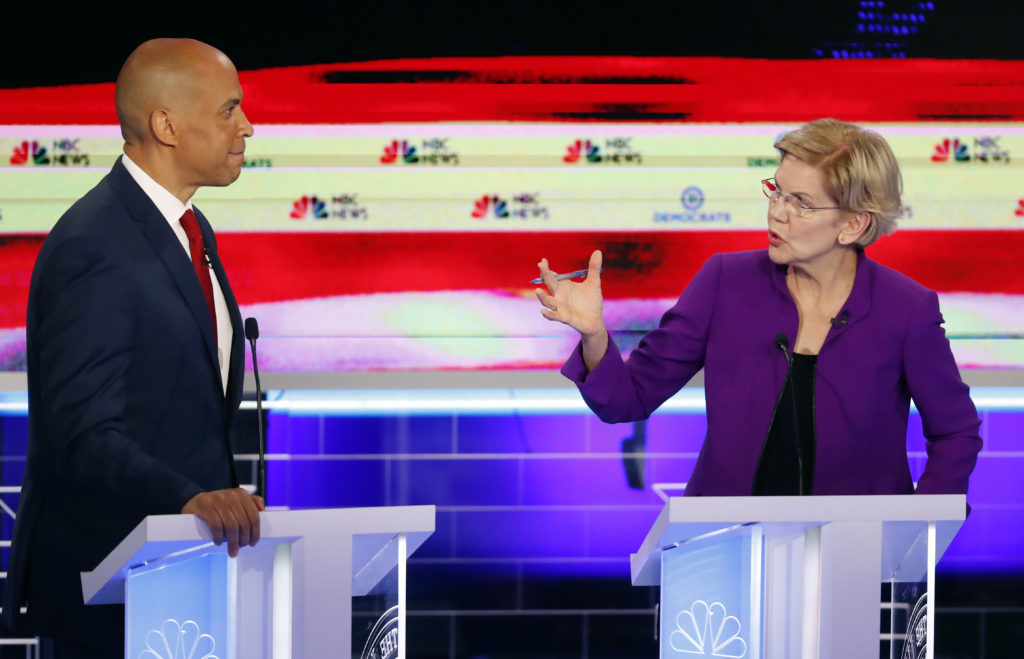
Sen. Elizabeth Warren of Massachusetts: Corruption in Washington? Warren says she has a plan for that, too. The candidate is one of seven who have promised during the Democratic primaries to reject fossil fuel money, corporate PACs, super PACs and contributions from federal lobbyists. Though Warren didn’t mention campaign finance reform specifically, she lead the pack on Wednesday night in remarks about money in politics. After opening the debate with a comment on corruption, Warren was one of two candidates to cite campaign contributions and lobbying, and the only candidate to bring up super PACs. During the campaign, Warren has routinely attacked the role big money plays in politics — but her campaign treasurer also has deep ties to the very money machines she’s been slamming.
Notable remarks:
“It has been far too long that the monopolies have been making the campaign contributions, have been funding the super PACs, have been out there making sure that their influence is heard and felt in every single decision that gets made in Washington.”
“Now, we have for far too long have had a Congress in Washington that has just completely dismissed what people care about across this country. They have made this country work much better than for those who can make giant contributions, made it work better for those who hire armies of lobbyists and lawyers, and not made it work for the people.”
Sen. Cory Booker of New Jersey: In a debate rife with zingers — from Sen. Amy Klobuchar on abortion rights to Rep. Tulsi Gabbard on military intervention — Booker fired a memorable shot at the Supreme Court’s seminal campaign finance decision, Citizens United v. Federal Election Commission. He also sounded off against corporate PACs and corporate political influence, singling out the pharmaceutical industry. But for a candidate chiding corporate power in politics, Booker has a long history of accepting campaign cash from corporate interests.
For example, earlier this decade while running for U.S. Senate, Booker accepted hundreds of thousands of dollars from people and political committees associated with the pharmaceutical manufacturing industry, according to the Center for Responsive Politics. Of that, $59,000 came from people and PACs affiliated with pharmaceutical company Merck & Co., headquartered in New Jersey. Booker has since changed his tune: he swore off of corporate PAC contributions (including the drug industry) almost a year before announcing his presidential candidacy. In Wednesday’s debate, Booker tried to further distance himself from pharmaceuticals, one of the main industries of his home state.
Notable remarks:
“At the end of the day, we have too much of a problem with corporate power growing. We see that with everything from Citizens United and the way they’re trying to influence Washington.”
“This is one of the reasons why well before I was running for president I said I would not take contributions from pharma companies, not take contributions from corporate PACs, or pharma executives, because they are part of this problem.”
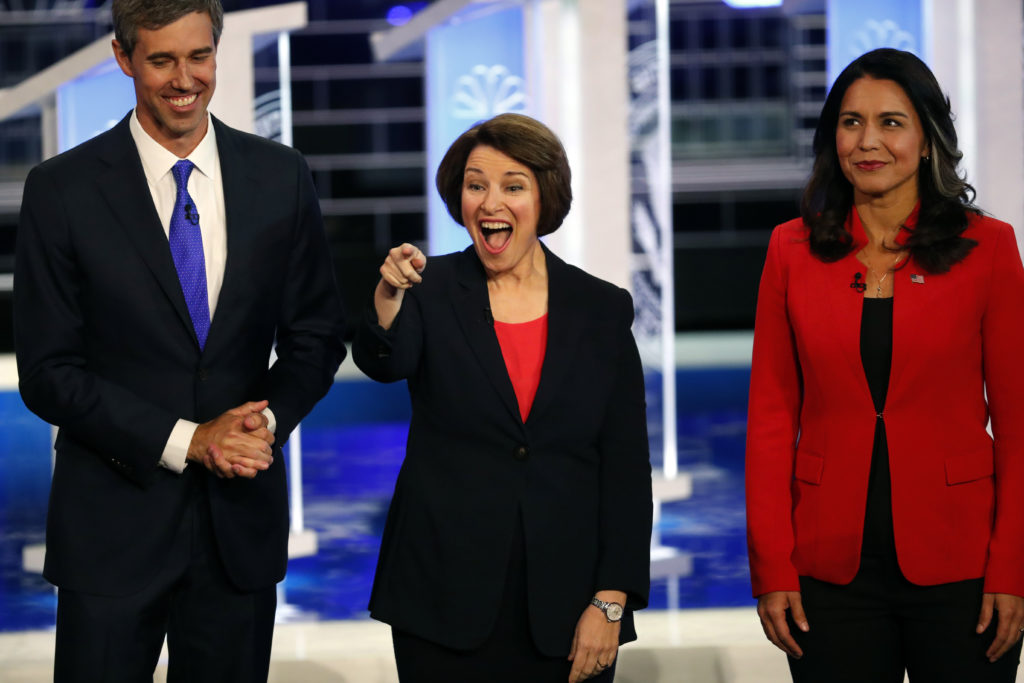
Former Rep. Beto O’Rourke of Texas: O’Rourke also spoke against about corporate political access — in Spanish. “Necesitamos incluir cada persona en el éxito de este economía, pero si queremos hacer eso, necesitamos incluir cada persona en nuestro democracia [sic],” O’Rourke said. Translation: “We need to include every person in the success of this economy, but if we want to do that, we need to include every person in our democracy,” he said in response to his first question from NBC anchor Savannah Guthrie. O’Rourke later demanded that the political system give credence to every voter and voice, rather than grant favorable outcomes to those with the most access.
Like Warren and Booker, O’Rourke has sworn off contributions from corporate PACs, federal lobbyists and fossil fuel interests and spoke out against super PACs, which cannot directly coordinate efforts with candidates but may support them independently. Despite these self-limitations, O’Rourke is a proven fundraiser: during the 2018 U.S. Senate election in Texas, he shattered the record for most money raised by a Senate candidate, bringing in $80.3 million. (He’d still lost to incumbent Sen. Ted Cruz, R-Texas, by fewer than three percentage points.)
Notable remarks:
“Right now, we have a system that favors those who can pay for access and outcomes. That’s how you explain an economy that is rigged to corporations and to the very wealthiest. … A new democracy that is revived because we’ve returned power to the people, no PACs, no gerrymandering, automatic and same-day voter registration to bring in more voters and a new Voting Rights Act to get rid of the barriers that are in place now.”
Sen. Amy Klobuchar of Minnesota: Responding a question about her incremental approach to healthcare, Klobuchar fired off perhaps Wednesday night’s most direct rebuke of corporate interests: “And pharma thinks they own Washington?” she said, “Well, they don’t own me.” In her most recent U.S. Senate campaign, Klobuchar did receive some support from corporate interests. For example, she was the top recipient among Senate candidates of money from people and PACs associated with the food, lodging and dairy industries — in line with her Midwestern roots. She has also accepted contributions from the CEOs of some of Minnesota’s largest publicly traded companies, including Land O’Lakes, General Mills and Polaris.
Notable remarks:
“I am the one that doesn’t have a political machine, that doesn’t come from money. And I don’t make all the promises that everyone up here makes.”
Former Vice President Joe Biden: Now on his third race for president — with a political career older than some of his fellow candidates — Biden has curated an extensive financial network. That includes an array of wealthy donors, such as director Steven Spielberg and people and PACs affiliated with Microsoft — both of whom have contributed to the American Possibilities PAC, which Biden led as a precursor to his 2020 presidential run. (Biden has since rejected contributions from corporate PACs and other interests.)
NBC anchor Savannah Guthrie called Biden out on connections such as these, stating: “Recently in remarks to a group of wealthy donors, as you were speaking about problem of income inequality in this country, you said we shouldn’t, quote, ‘demonize the rich.’ You said, ‘Nobody has to be punished. No one’s standard of living would change. Nothing would fundamentally change.’ What did you mean by that?” Biden did not address the question directly, instead pivoting toward Donald Trump and the issue of income inequality.
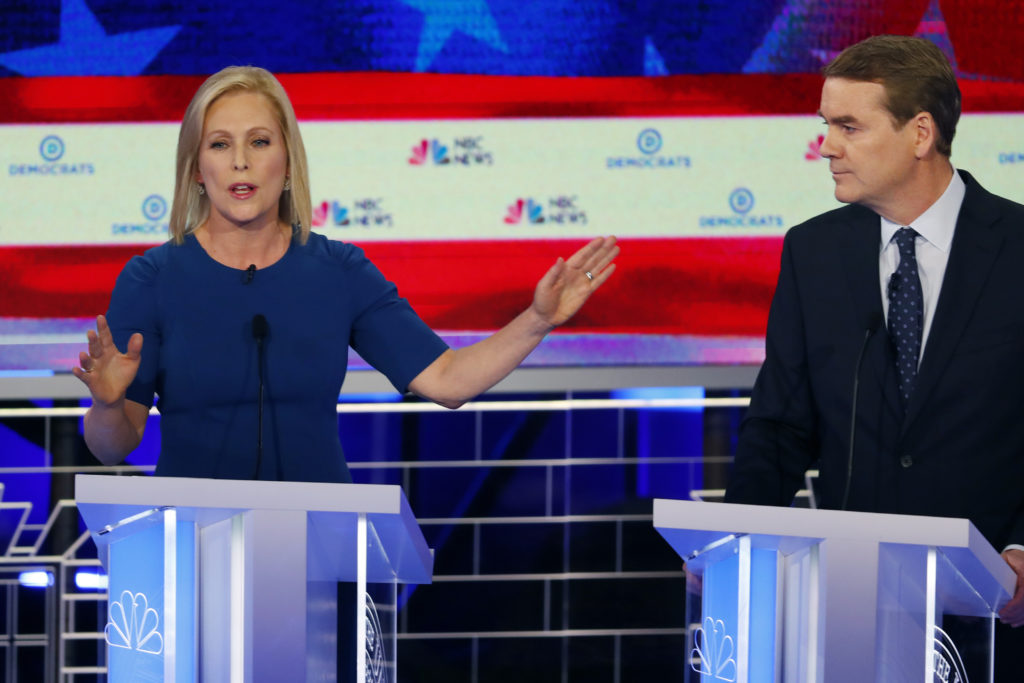
Sen. Michael Bennet of Colorado: “When you ask about Washington’s dysfunction, 96 percent of the American people blame it on money in politics. Ninety-four percent blame wealthy political donors. And I think one of the reasons why the American people put a reality TV star in charge of this government is that they had so little faith in the system,” Bennet told the Center for Public Integrity in a conference call last week, citing a Washington Post poll.
Bennet was one of two candidates — including Booker — to directly criticize Citizens United v. FEC, the Supreme Court case that opened the floodgates for corporate expenditures on elections. In the same breath, the senator from Colorado also called to address the 2013 Supreme Court case Shelby County v. Holder, which declared parts of the Voting Rights Act unconstitutional. Bennet maintains a long history of denouncing the Citizens United v. FEC decision.
Notable remarks: “The court today said they couldn’t do anything about it. We need to overturn Citizens United. The court was the one that gave us Citizens United. And the attack on voting rights in Shelby v. Holder is something we need to deal with.”
Sen. Kristen Gillibrand of New York: As the only candidate to denounce money in politics by name, Gillibrand let the daylight shine through on Thursday night. The senator from New York has pressed a “clean elections” plan to publicly fund political campaigns. During the debate, she claimed that she has the “most comprehensive approach” among her competitors to combat corruption and remove money from politics. She capped off the night by doubling down once more on her self-proclaimed tough stance against money in politics.
Notable remarks: “You’ve heard a lot of good things on this stage tonight, and a lot of plans, but the truth is that until you go to the root of the corruption, the money in politics, the fact that Washington is run by the special interests, you are never going to solve any of these problems.”
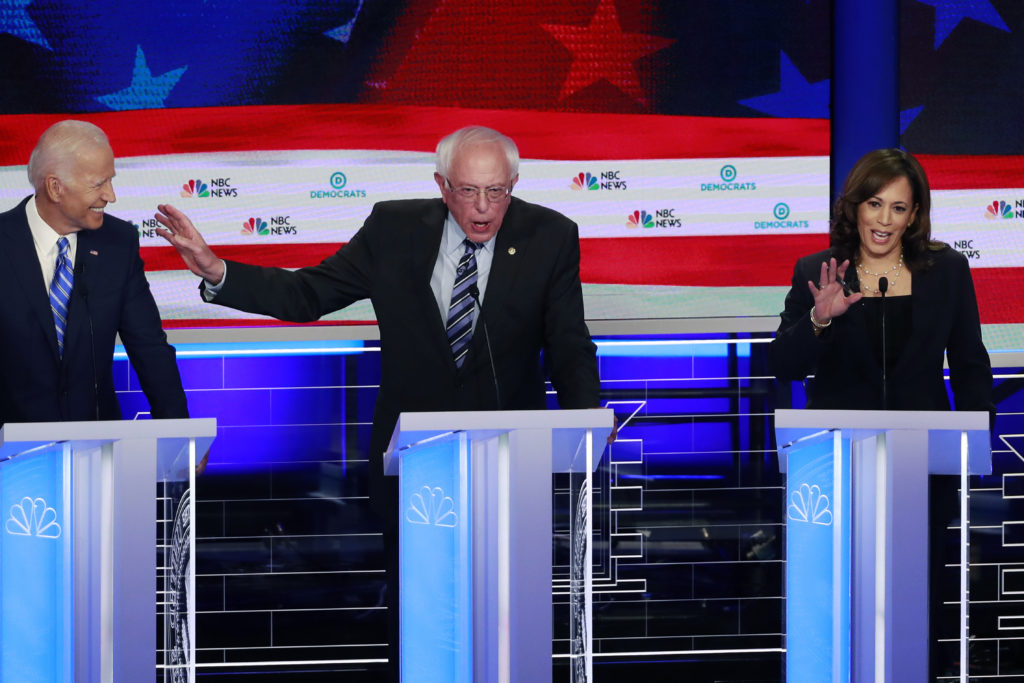
Sen. Bernie Sanders of Vermont: The only candidate who openly considers himself a socialist, Sanders held true to his refrain against “big money” during Thursday night’s debate. While all but four of his fellow Democrats — Governor Steve Bullock of Montana, former Governor John Hickenlooper of Colorado, Rep. Tulsi Gabbard of Hawaii and former Rep. John Delaney of Maryland — have sworn off of donations from fossil fuel interests, Sanders was the only voice to challenge the industry specifically. Twice during the debate he called for the Democratic party and the people to “stand up” to special interests in Washington.
Notable remarks: “We need a party that is diverse, but we need a party that has the guts to stand up to the powerful special interests who have so much power over the economic and political life of this country. … The issue is, who has the guts to take on Wall Street, to take on the fossil fuel industry, to take on the big money interests who have unbelievable influence over the economic and political life of this country?”
Read more in Money and Democracy
Elections
FEC gets new internal watchdog following tumultuous search
Internal sabotage, resignations and a finalist flame-out marred election agency’s hiring efforts
Elections
Red shift: How Republicans aim to catch up to Democrats in online fundraising
After several false starts, conservatives believe they have an answer to liberals’ ActBlue
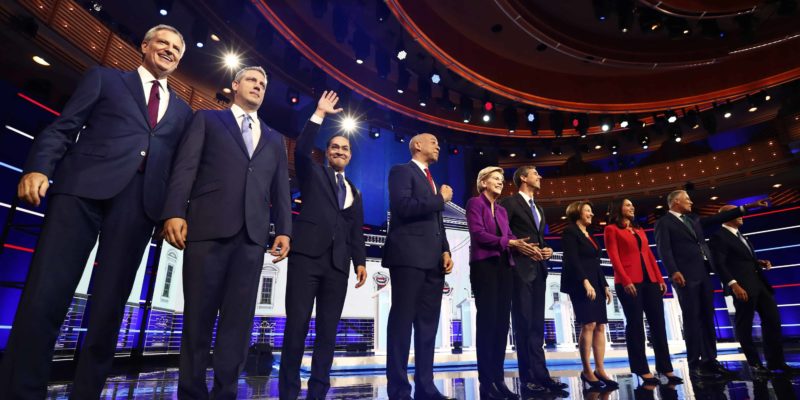

Join the conversation
Show Comments